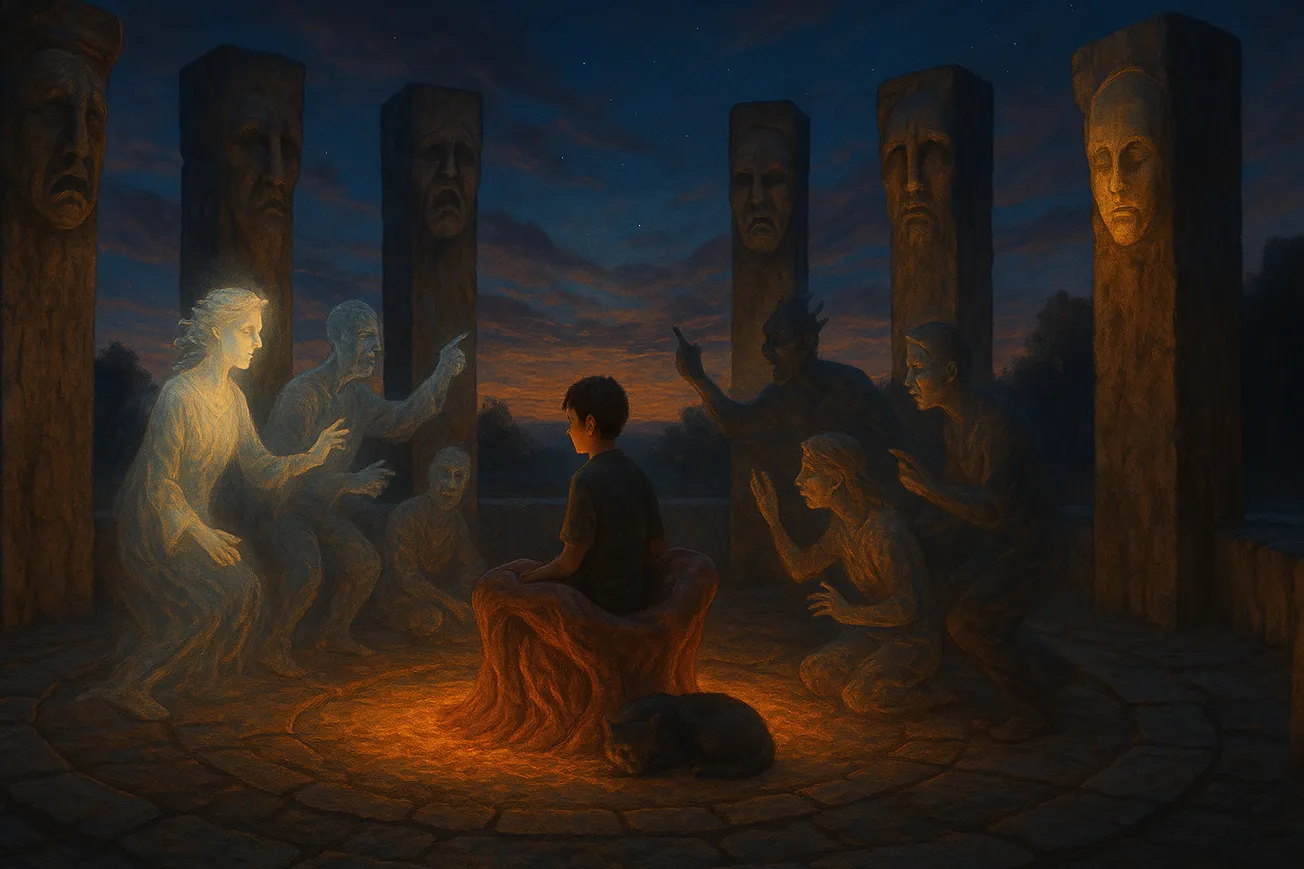🌈 The Fractal Story Engine | Mind & Meaning | (13) MM-004-S
When the boy came of age, he was led blindfolded into the Chamber.
The Chamber had no roof. Its walls were not walls, but wind. Stone pillars ringed the circle, each carved with a different face. Some faces wept. Others laughed with cruel teeth. One looked upward, empty-eyed, as if waiting for a sound that had not yet been spoken.
In the center was the Seat of Flesh.
They sat him there. He was trembling, though the ground beneath him pulsed with warmth, like a sleeping beast that knew his name. The Elders left him. The wind hushed.
Then the voices began.
One by one, they stepped from the shadows. Not with bodies, but with essences, slick and subtle and too many to count. He could not see them. He only felt their shapes behind his ribs.
“I am the One Who Remembers,” said the first. “I keep the wounds open, so we do not walk into them again.”
“I am the One Who Forgets,” whispered another, softer. “I keep the pain numbed, so we may walk forward.”
“I am the Pleaser,” sang a voice like sugar on metal. “Let us make them smile. Let us be loved.”
“I am the Tyrant,” thundered another. “Obedience is peace. Punishment is proof. Stay small.”
They came, and came, and came.
“I dream of water.”
“I hoard the knives.”
“I want to dance and wear no name.”
Each voice curled into the Seat with him. They were old. Some had been born before he was. Others arrived with every ache he never named. He had carried them all like invisible lanterns, lighting rooms he never entered.
Now, they argued.
Should he speak or stay silent? Should he leave or kneel? Should he reach for the apple or let it rot?
Their debate never ended. They voted by silence. They changed sides mid-sentence. They cheered and scorned in the same breath. And when the boy spoke aloud, he could not tell which of them had made the choice.
On the third night, the boy rose from the Seat.
He walked the circle and touched each face carved into the pillars. The stone was warm. The eyes followed him.
He whispered to the laughing face, “You led me to false gold.”
He whispered to the weeping one, “You taught me how to feel.”
He came to the face that had no mouth. Its forehead was cracked. Its neck unfinished.
“Who are you?” he asked.
The wind stilled.
From the hollow throat of that faceless face, a sound emerged, not a word, but a hum—low and round like the rim of a bowl struck with purpose. The sound entered him.
And he remembered.
There had been another voice. One that never joined the debates. One that watched. One that waited for quiet.
The Observer.
Not neutral, not cold. Just deep. Vast. Patient.
He returned to the Seat of Flesh. He sat again. But this time, he did not listen to the loudest voice. He did not chase consensus. He did not beg for certainty.
He waited.
And in that waiting, the Committee shifted. Some left. Some merged. One curled at his feet like a cat and purred.
The Tyrant quieted. The Pleaser wept and became a song.
And through the center of him, the Observer’s hum widened into a silence so full it rang.
The next morning, when he emerged from the Chamber, the Elders bowed—not because he had mastered his voices, but because he had met them.
And in the meeting, he had chosen to listen beyond.

